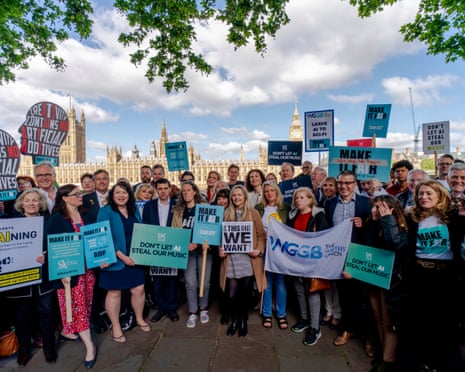The Battle for Creative Rights
Music creators and politicians took to the streets on May 7, 2025, to protest against the government’s controversial AI bill. The demonstration, captured by Jordan Pettitt/PA, highlights the growing concern over the proposed legislation that could decimate Britain’s thriving creative industries.

Beeban Kidron, film director and crossbench peer in the House of Lords, argues that the government’s plan would allow mass cultural theft. “The government has doubled down on plans that would allow AI companies to steal copyrighted work by default unless the owners ‘opt out,'” Kidron explains. However, opting out is nearly impossible without AI transparency.
The issue began when the government launched a consultation on regulating artificial intelligence with a “preferred” outcome that undermines copyright law. This move has been met with fierce resistance from legends across various creative fields, including music, literature, and visual arts. Elton John recently voiced his outrage, stating, “The government have no right to do this to my songs. They have no right to do it to anybody’s songs, or anybody’s prose.”
In response to the government’s inaction, Kidron and her colleagues across party lines in the House of Lords have proposed emergency transparency measures to the data (use and access) bill. Their amendment aims to enable the enforcement of existing copyright law by requiring AI firms to disclose when they use copyrighted material. Despite gaining support from an increasing number of lords, the government has repeatedly voted down these provisions.
Secretary of State for Technology, Peter Kyle, faced intense scrutiny in the House of Lords, where he admitted that much content has already been used by AI models. However, he failed to provide a solution or timeline to address the issue. Kyle’s statement contradicted his actions, as he simultaneously rejected the Lords’ provisions designed to prevent further theft.
The government’s inaction has sparked outrage among MPs and creatives alike. One MP likened the situation to “one of our greatest industrial sectors being on fire while ministers have a picnic on the lawn with the arsonists.” The creative industries, which provide 2.4 million jobs and contribute £126 billion to the UK’s economy, are on the brink of disaster.
The battle is far from over. The data (use and access) bill will return to the Lords on June 2, offering another chance for change. As Kidron emphasizes, “A nation that gives away its capacity to tell its own story is a fragile place indeed.” The fate of Britain’s creative industries and cultural heritage hangs in the balance.


